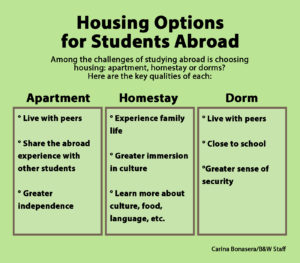 Students who choose to study abroad must think about more than classes and cultural barriers — they also need to consider where they will stay.
Students who choose to study abroad must think about more than classes and cultural barriers — they also need to consider where they will stay.
In general, Lehigh students who go abroad have the option to live in an apartment, home-stay or dorm.
Baylie Harris, ’19, spent a semester studying abroad in Copenhagen, Denmark and lived in an apartment with seven other students.
“I wouldn’t change it if I had to go back,” Harris said. “I definitely liked living with other people my age and experiencing the program and culture with people experiencing the same thing as I was.”
Harris said her apartment was in the ideal location — a five-minute walk to class and the city center. The apartment had two bathrooms, a large kitchen and a common area.
Living in an apartment, as opposed to a dorm, gave Harris a newfound sense of freedom. She said going abroad is already a step toward independence, but living on her own let her break out of her comfort zone.
“It allows you to get a better sense of who you are outside of the normal campus that you know,” Harris said. “It prepares you for the real world.”
Harris said there were resident advisers in the building who checked in on students, so she did have a support system if she needed it.
Although Harris chose to live in an apartment, students studying abroad can also opt to live in a home-stay.
Kendall Glynn, ’19, decided to experience a home-stay when she studied abroad in Madrid.
“I was like, ‘you know what? I’m just going to go out of my comfort zone and do this,’” Glynn said. “I also felt like a home-stay would be kind of like a little piece of home that you can have while you’re abroad. You still have a motherly figure in your life.”
Glynn lived with Cat Oribe, ’19, and said their host mother was extremely welcoming to them.
Glynn said living in a home-stay felt like she was implanted into a normal family where she and Oribe were accepted as their host mother’s children. She felt more informed living with someone native to Madrid. Her host mother taught them how to navigate the city and cooked traditional meals.
”I think that it really forced (us) to actually immerse (ourselves) in not only the language, but also the day to day life of what a person who really lives in Madrid does,” Glynn said.
Going into the semester, Glynn said she could only speak beginner-level Spanish, but it was easy to learn the language when she was immersed in it. Her host mother spoke no English to the girls and taught them grammar and casual phrase.
Glynn believes some students might feel hesitant to choose a home-stay because they are scared to lose their freedom, but she did not feel that way.
“I think a lot of the home-stay moms that sign up for it really are on the same page as the students and just want them to have a good time,” Glynn said. ”We got more out of it, I think, than our friends who stayed in apartments or dorms in terms of food and learning the language.”
Most programs abroad also offer traditional dorm living.
Amanda Stein, ’19, lived in a dorm when she studied abroad at Tel Aviv University in Israel.
“I liked the dorms because we were literally across from campus,” Stein said. “I really felt like I was at the school.”
Stein stayed in a suite with three other students, and said she enjoyed living in a group setting. Living close to campus with other students gave her a sense of security.
Stein said she enjoyed living in a dorm, but she would’ve liked to be more immersed in the city, as she lived with other American students.
“I think being able to walk out of your apartment into Tel Aviv or whatever city you’re studying in is a little bit different than living in a dorm,” she said, but added that living in a dorm didn’t harm her experience.





Comment policy
Comments posted to The Brown and White website are reviewed by a moderator before being approved. Incendiary speech or harassing language, including comments targeted at individuals, may be deemed unacceptable and not published. Spam and other soliciting will also be declined.
The Brown and White also reserves the right to not publish entirely anonymous comments.
1 Comment
Wow I think I wanna be in a homestay now